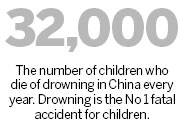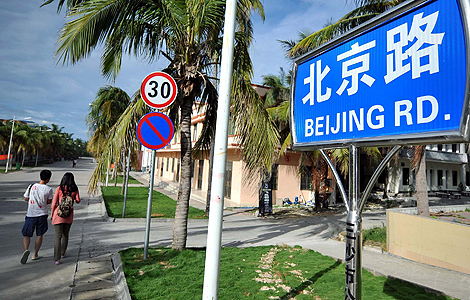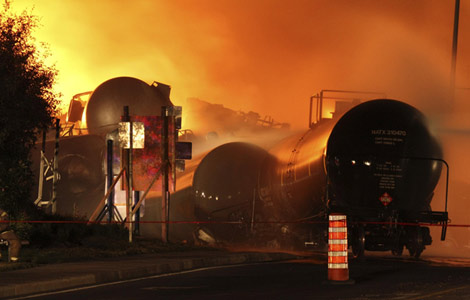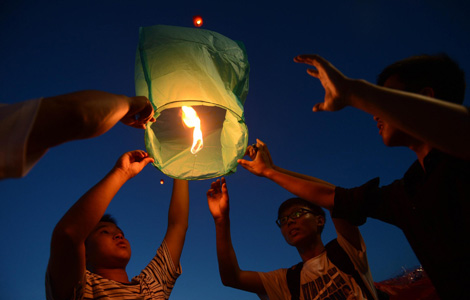Funds needed to prevent young from drowning
Updated: 2013-07-09 07:08
By Zhou Wenting in Shanghai (China Daily)
|
||||||||

The government has been urged to allocate more funds to fence off water hazards such as ponds, reservoirs and streams, especially in the countryside, after a string of fatal accidents involving children.
At least 21 youngsters have drowned in rural areas since June 20, including at a village in Nanchang, Jiangxi province, where two brothers, aged 5 and 10, and their 9-year-old sister died on June 26.
As in most other cases, onlookers said there were no barriers around the water to prevent children from gaining access.

"If a country really cares about the safety of every child, it will do anything it can to help prevent tragedies," said Professor Ye Jingzhong of China Agricultural University's School of Humanities and Development.
"Any detail in protecting children reflects the attitude of the country toward youngsters, but no major improvement has been witnessed over the years."
According to local authorities, there is a definite will to improve safety at potentially hazardous spots but the problem is money.
A photo of officials placing a "No swimming" sign next to a pond at Tongyang, a rural town in Anhui province, received much praise after it was widely circulated on the Internet. That response can be partially credited to the fact such sight is rare in the countryside.
"Our jurisdiction covers more than 200 villages, each with numerous ponds of different sizes," said Zou Jingbo, director of Party and government administration for Shengmi town, which includes the village where the three siblings died in Jiangxi province.
"We admit there's a discrepancy in the number of warning signs, but we simply don't have the funds" to cover all potential hazards, he said.
Zou declined to go into details about the difficulties, but said his government receives limited financial help from higher authorities to subsidize safety programs aimed at minors.
Health authorities said about 32,000 children die of drowning every year, making it the No 1 fatal accident for children.
China has diverse geographical environments and warning signs are needed in many places, say experts, including some who argue that the shortfall in financial support shows a lack of people-oriented awareness in policymaking.
"Spending on child protection at different levels of government is tiny due to tight budgets and other reasons," said Hu Xingdou, a professor of economics at the Beijing Institute of Technology.
If governments get sufficient funds for projects, he said, they can also employ inspection staff and equip ponds with life buoys and long ropes, as well as start training courses of self-rescue and saving others for villagers.
Lianqiao village in Zhejiang province put aside 1.5 million yuan ($245,000) to build a 50-meter swimming pool last year, which is open to the public for free.
The collective economic income of the village - with a population of about 800 - is 200,000 yuan a year, and the costs of managing and disinfecting the pool take up nearly a seventh of that amount, said Sun Jianyuan, the village head.
"We're willing to spend such a large amount of money because it relates to the safety of children," he added.
In major cities such as Shanghai and Tianjin, many primary and middle schools have started to provide swimming courses to students.
All 47 primary schools in Shanghai's Xuhui district started swimming classes in 2005 and students should be able to swim for at least 15 meters and rescue themselves after falling into the water suddenly after a year's learning.
Students can also go to 91 swimming pools this summer in Shanghai for between 5 to 15 yuan.
zhouwenting@chinadaily.com.cn
(China Daily USA 07/09/2013 page5)

 China's youngest city glistens under palm trees
China's youngest city glistens under palm trees
 Xinjiang tourism recovering
Xinjiang tourism recovering
 Quebec disaster death toll jumps to 13
Quebec disaster death toll jumps to 13
 Mourn for students in San Francisco air crash
Mourn for students in San Francisco air crash
 Rolling stone finally settles
Rolling stone finally settles
 Double-decker bus caught fire in Shanghai
Double-decker bus caught fire in Shanghai
 China, Russia begin live-fire navy drill
China, Russia begin live-fire navy drill
 Grape expectations for Xinjiang county
Grape expectations for Xinjiang county
Most Viewed
Editor's Picks

|

|

|

|

|

|
Today's Top News
Air crash victims' families arrive in SF
Hopes are high for US, China talks
Laden's life on the run revealed
US mulls hastening withdrawal from Afghanistan
China's inflation grows 2.7% in June
Country singer Randy Travis in critical condition
Police look for suspects in Brazil soccer slaying
Nuclear power pricing system launched
US Weekly

|

|






